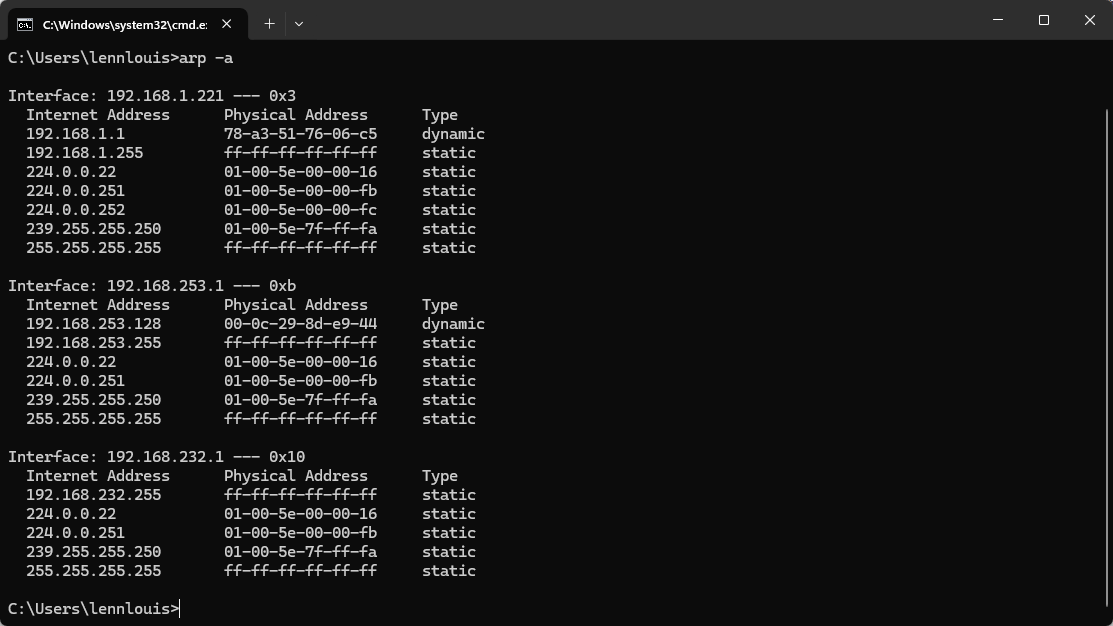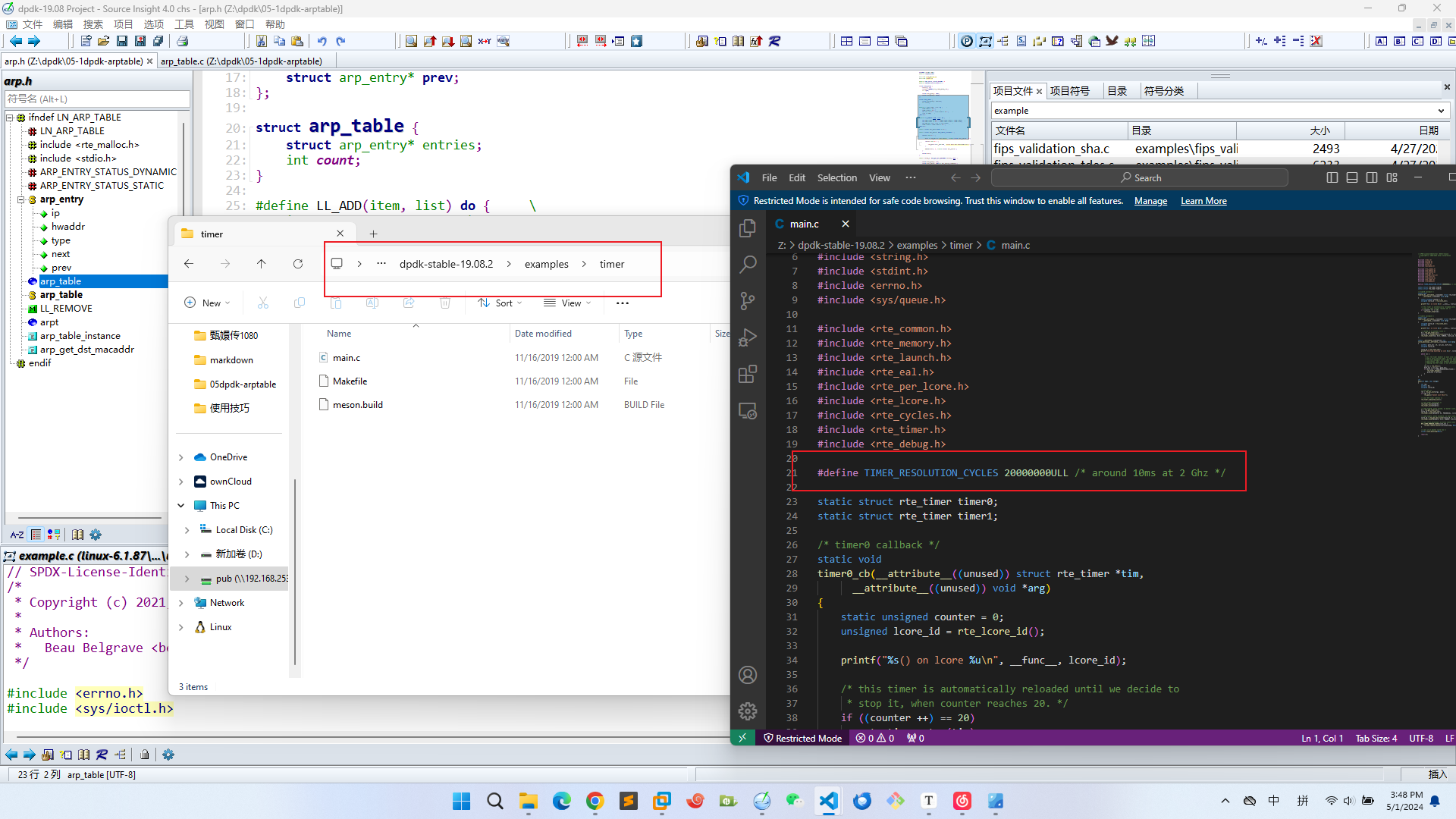之前有写过arp reply的实现,其中有写道,我们的系统内核中会维护一张ARP表,可以通过终端arp -a查看:

其中的dynamic和static是动态arp的类型,之前的udp实验就是添加了一条静态arp达到了发送的目的。在我们需要发送一个数据包的时候。指定好ip,内核会在arp表中寻找对应的ip,然后向他发送。在用户太协议栈中,DPDK同样需要维护一张arp表,实现类似的功能。
链表实现的ARP表
#ifndef LN_ARP_TABLE
#define LN_ARP_TABLE
#include <rte_malloc.h>
#include <stdio.h>
#define ARP_ENTRY_STATUS_DYNAMIC 0
#define ARP_ENTRY_STATUS_STATIC 1
struct arp_entry {
uint32_t ip;
uint8_t hwaddr[RTE_ETHER_ADDR_LEN];
int type;
struct arp_entry* next;
struct arp_entry* prev;
};
struct arp_table {
struct arp_entry* entries;
int count;
}
#define LL_ADD(item, list) do { \
item->next = NULL; \
item->prev = NULL; \
if(list != NULL) list->prev = NULL; \
list = item; \
}while(0)
#define LL_REMOVE(item, list) do { \
if(item->prev != NULL) item->prev->next = item->next; \
if(item->next != NULL) item->next->prev = item->prev; \
if(item == list) list = list->next; \
item->prev = item->next = NULL; \
}while(0)
static struct arp_table arpt = NULL;
static struct arp_table* arp_table_instance() {
if(arpt == NULL) {
arpt = rte_malloc("arp table", sizeof(struct arp_table), 0);
if(arpt == NULL) {
rte_exit(EXIT_FAILURE, "Error with arp table malloc\n");
}
memset(arpt, 0, sizeof(struct arp_table));
}
return arpt;
}
static uint8_t* arp_get_dst_macaddr(uint32_t dip) {
struct arp_entry* ite;
struct arp_table* table = arp_table_instance();
for(ite = table->entries; ite != NULL; ite = ite->next) {
if(dip == ite->ip) {
return ite->hwaddr;
}
}
return NULL;
}
#endif
这里采用的是一个单例模式,线程安全等后面再迭代。这里实现的是一个头单项链表,只能头插。arp表一般来说不会太大,所以使用链表就可以了。或者说其实再大胆一点,数组也是可以的。代码中有LL_ADD和LL_REMOVE两个宏来进行链表的增加和删除节点。具体如何使用,需要看我们再主函数中的使用过程。
定时器
-
为什么需要定时器?
arp协议是一种广播协议,我们需要定时向局域网发起广播,公布自己的arp同时获取别人的arp来更新arp表。
这里是使用的DPDK提供出来的一个定时器组件,我直接抽离出来记录,避免代码繁多看起来眼花缭乱。
#define TIMER_RESOLUTION_CYCLES 120000000000ULL // 10ms * 1000 = 10s * 6
首先是有一个宏,这个有点像单片机里的知识。根据始终的频率,再一秒钟之内的滴答次数不一样,这里是记录一个抵达次数如果到达这个次数就广播arp。那这个次数是如何计算出来的呢?其实是再例程里面有的:

这里说20000000ULL是对应的10ms的时间间隔,所以可以算出,我们这里的宏是一分钟,广播一次。
rte_timer_subsystem_init();
struct rte_timer arp_timer;
rte_timer_init(&arp_timer);
uint64_t hz = rte_get_timer_hz();
unsigned lcore_id = rte_lcore_id();
rte_timer_reset(&arp_timer, hz, PERIODICAL, lcore_id, arp_request_timer_cb, mbuf_pool);
rte_timer_subsystem_init()函数会初始化相关的数据结构和配置,以便后续使用计时器功能rte_get_timer_hz取得系统计时器的频率rte_lcore_id返回执行当前代码的逻辑核心IDarp_request_timer_cb是自己写的定时器执行的回调函数,执行业务逻辑
static uint64_t prev_tsc = 0, cur_tsc;
uint64_t diff_tsc;
cur_tsc = rte_rdtsc();
diff_tsc = cur_tsc - prev_tsc;
if (diff_tsc > TIMER_RESOLUTION_CYCLES) {
rte_timer_manage();
prev_tsc = cur_tsc;
}
rte_timer_manage会检查所有注册的定时器,对超时任务进行处理。
具体实现
arp打包
static int ng_encode_arp_pkt(uint8_t *msg, uint16_t opcode, uint8_t *dst_mac, uint32_t sip, uint32_t dip) {
// 1 ethhdr
struct rte_ether_hdr *eth = (struct rte_ether_hdr *)msg;
rte_memcpy(eth->s_addr.addr_bytes, gSrcMac, RTE_ETHER_ADDR_LEN);
if (!strncmp((const char *)dst_mac, (const char *)gDefaultArpMac, RTE_ETHER_ADDR_LEN)) {
uint8_t mac[RTE_ETHER_ADDR_LEN] = {0x0};
rte_memcpy(eth->d_addr.addr_bytes, mac, RTE_ETHER_ADDR_LEN);
} else {
rte_memcpy(eth->d_addr.addr_bytes, dst_mac, RTE_ETHER_ADDR_LEN);
}
eth->ether_type = htons(RTE_ETHER_TYPE_ARP);
// 2 arp
struct rte_arp_hdr *arp = (struct rte_arp_hdr *)(eth + 1);
arp->arp_hardware = htons(1);
arp->arp_protocol = htons(RTE_ETHER_TYPE_IPV4);
arp->arp_hlen = RTE_ETHER_ADDR_LEN;
arp->arp_plen = sizeof(uint32_t);
arp->arp_opcode = htons(opcode);
rte_memcpy(arp->arp_data.arp_sha.addr_bytes, gSrcMac, RTE_ETHER_ADDR_LEN);
rte_memcpy( arp->arp_data.arp_tha.addr_bytes, dst_mac, RTE_ETHER_ADDR_LEN);
arp->arp_data.arp_sip = sip;
arp->arp_data.arp_tip = dip;
return 0;
}
static struct rte_mbuf *ng_send_arp(struct rte_mempool *mbuf_pool, uint16_t opcode, uint8_t *dst_mac, uint32_t sip, uint32_t dip) {
const unsigned total_length = sizeof(struct rte_ether_hdr) + sizeof(struct rte_arp_hdr);
struct rte_mbuf *mbuf = rte_pktmbuf_alloc(mbuf_pool);
if (!mbuf) {
rte_exit(EXIT_FAILURE, "rte_pktmbuf_alloc\n");
}
mbuf->pkt_len = total_length;
mbuf->data_len = total_length;
uint8_t *pkt_data = rte_pktmbuf_mtod(mbuf, uint8_t *);
ng_encode_arp_pkt(pkt_data, opcode, dst_mac, sip, dip);
return mbuf;
}
这里的两个函数相较于之前的添加了一个opcode参数,因为之前的是默认reply的,这里需要区别是reply还是request,其他没什么变化。
arp广播
static void arp_request_timer_cb(__attribute__((unused)) struct rte_timer *tim, void *arg) {
struct rte_mempool *mbuf_pool = (struct rte_mempool *)arg;
int i = 0;
for (i = 1;i <= 254;i ++) {
uint32_t dstip = (gLocalIp & 0x00FFFFFF) | (0xFF000000 & (i << 24));
struct in_addr addr;
addr.s_addr = dstip;
printf("arp ---> src: %s \n", inet_ntoa(addr));
struct rte_mbuf *arpbuf = NULL;
uint8_t *dstmac = ng_get_dst_macaddr(dstip);
if (dstmac == NULL) {
arpbuf = ng_send_arp(mbuf_pool, RTE_ARP_OP_REQUEST, gDefaultArpMac, gLocalIp, dstip);
} else {
arpbuf = ng_send_arp(mbuf_pool, RTE_ARP_OP_REQUEST, dstmac, gLocalIp, dstip);
}
rte_eth_tx_burst(gDpdkPortId, 0, &arpbuf, 1);
rte_pktmbuf_free(arpbuf);
}
}
这里是对网段中的所有ip发起request请求,我感觉这里有必要梳理一下这个dip的逻辑,毕竟这个代码看着怎么像寄存器[狗头]。假设本地ip是192.168.1.111:因为网络字节序是反的,所以(gLocalIp & 0x00FFFFFF)是把其中的111设为0;(0xFF000000 & (i << 24))从1-255分别将低位置1,这样就形成了目的ip;
完整代码
#include <rte_eal.h>
#include <rte_ethdev.h>
#include <rte_mbuf.h>
#include <rte_malloc.h>
#include <rte_timer.h>
#include <stdio.h>
#include <arpa/inet.h>
#include "arp.h"
#define ENABLE_SEND 1
#define ENABLE_ARP 1
#define ENABLE_ICMP 1
#define ENABLE_ARP_REPLY 1
#define ENABLE_DEBUG 1
#define ENABLE_TIMER 1
#define NUM_MBUFS (4096-1)
#define BURST_SIZE 32
#define TIMER_RESOLUTION_CYCLES 120000000000ULL // 10ms * 1000 = 10s * 6
#if ENABLE_SEND
#define MAKE_IPV4_ADDR(a, b, c, d) (a + (b<<8) + (c<<16) + (d<<24))
static uint32_t gLocalIp = MAKE_IPV4_ADDR(192, 168, 1, 184);
static uint32_t gSrcIp; //
static uint32_t gDstIp;
static uint8_t gSrcMac[RTE_ETHER_ADDR_LEN];
static uint8_t gDstMac[RTE_ETHER_ADDR_LEN];
static uint16_t gSrcPort;
static uint16_t gDstPort;
#endif
#if ENABLE_ARP_REPLY
static uint8_t gDefaultArpMac[RTE_ETHER_ADDR_LEN] = {0xFF, 0xFF, 0xFF, 0xFF, 0xFF, 0xFF};
#endif
int gDpdkPortId = 0;
static const struct rte_eth_conf port_conf_default = {
.rxmode = {.max_rx_pkt_len = RTE_ETHER_MAX_LEN }
};
static void ng_init_port(struct rte_mempool *mbuf_pool) {
uint16_t nb_sys_ports= rte_eth_dev_count_avail(); //
if (nb_sys_ports == 0) {
rte_exit(EXIT_FAILURE, "No Supported eth found\n");
}
struct rte_eth_dev_info dev_info;
rte_eth_dev_info_get(gDpdkPortId, &dev_info); //
const int num_rx_queues = 1;
const int num_tx_queues = 1;
struct rte_eth_conf port_conf = port_conf_default;
rte_eth_dev_configure(gDpdkPortId, num_rx_queues, num_tx_queues, &port_conf);
if (rte_eth_rx_queue_setup(gDpdkPortId, 0 , 1024,
rte_eth_dev_socket_id(gDpdkPortId),NULL, mbuf_pool) < 0) {
rte_exit(EXIT_FAILURE, "Could not setup RX queue\n");
}
#if ENABLE_SEND
struct rte_eth_txconf txq_conf = dev_info.default_txconf;
txq_conf.offloads = port_conf.rxmode.offloads;
if (rte_eth_tx_queue_setup(gDpdkPortId, 0 , 1024,
rte_eth_dev_socket_id(gDpdkPortId), &txq_conf) < 0) {
rte_exit(EXIT_FAILURE, "Could not setup TX queue\n");
}
#endif
if (rte_eth_dev_start(gDpdkPortId) < 0 ) {
rte_exit(EXIT_FAILURE, "Could not start\n");
}
}
static int ng_encode_udp_pkt(uint8_t *msg, unsigned char *data, uint16_t total_len) {
// encode
// 1 ethhdr
struct rte_ether_hdr *eth = (struct rte_ether_hdr *)msg;
rte_memcpy(eth->s_addr.addr_bytes, gSrcMac, RTE_ETHER_ADDR_LEN);
rte_memcpy(eth->d_addr.addr_bytes, gDstMac, RTE_ETHER_ADDR_LEN);
eth->ether_type = htons(RTE_ETHER_TYPE_IPV4);
// 2 iphdr
struct rte_ipv4_hdr *ip = (struct rte_ipv4_hdr *)(msg + sizeof(struct rte_ether_hdr));
ip->version_ihl = 0x45;
ip->type_of_service = 0;
ip->total_length = htons(total_len - sizeof(struct rte_ether_hdr));
ip->packet_id = 0;
ip->fragment_offset = 0;
ip->time_to_live = 64; // ttl = 64
ip->next_proto_id = IPPROTO_UDP;
ip->src_addr = gSrcIp;
ip->dst_addr = gDstIp;
ip->hdr_checksum = 0;
ip->hdr_checksum = rte_ipv4_cksum(ip);
// 3 udphdr
struct rte_udp_hdr *udp = (struct rte_udp_hdr *)(msg + sizeof(struct rte_ether_hdr) + sizeof(struct rte_ipv4_hdr));
udp->src_port = gSrcPort;
udp->dst_port = gDstPort;
uint16_t udplen = total_len - sizeof(struct rte_ether_hdr) - sizeof(struct rte_ipv4_hdr);
udp->dgram_len = htons(udplen);
rte_memcpy((uint8_t*)(udp+1), data, udplen);
udp->dgram_cksum = 0;
udp->dgram_cksum = rte_ipv4_udptcp_cksum(ip, udp);
struct in_addr addr;
addr.s_addr = gSrcIp;
printf(" --> src: %s:%d, ", inet_ntoa(addr), ntohs(gSrcPort));
addr.s_addr = gDstIp;
printf("dst: %s:%d\n", inet_ntoa(addr), ntohs(gDstPort));
return 0;
}
static struct rte_mbuf * ng_send_udp(struct rte_mempool *mbuf_pool, uint8_t *data, uint16_t length) {
// mempool --> mbuf
const unsigned total_len = length + 42;
struct rte_mbuf *mbuf = rte_pktmbuf_alloc(mbuf_pool);
if (!mbuf) {
rte_exit(EXIT_FAILURE, "rte_pktmbuf_alloc\n");
}
mbuf->pkt_len = total_len;
mbuf->data_len = total_len;
uint8_t *pktdata = rte_pktmbuf_mtod(mbuf, uint8_t*);
ng_encode_udp_pkt(pktdata, data, total_len);
return mbuf;
}
#if ENABLE_ARP
static int ng_encode_arp_pkt(uint8_t *msg, uint16_t opcode, uint8_t *dst_mac, uint32_t sip, uint32_t dip) {
// 1 ethhdr
struct rte_ether_hdr *eth = (struct rte_ether_hdr *)msg;
rte_memcpy(eth->s_addr.addr_bytes, gSrcMac, RTE_ETHER_ADDR_LEN);
if (!strncmp((const char *)dst_mac, (const char *)gDefaultArpMac, RTE_ETHER_ADDR_LEN)) {
uint8_t mac[RTE_ETHER_ADDR_LEN] = {0x0};
rte_memcpy(eth->d_addr.addr_bytes, mac, RTE_ETHER_ADDR_LEN);
} else {
rte_memcpy(eth->d_addr.addr_bytes, dst_mac, RTE_ETHER_ADDR_LEN);
}
eth->ether_type = htons(RTE_ETHER_TYPE_ARP);
// 2 arp
struct rte_arp_hdr *arp = (struct rte_arp_hdr *)(eth + 1);
arp->arp_hardware = htons(1);
arp->arp_protocol = htons(RTE_ETHER_TYPE_IPV4);
arp->arp_hlen = RTE_ETHER_ADDR_LEN;
arp->arp_plen = sizeof(uint32_t);
arp->arp_opcode = htons(opcode);
rte_memcpy(arp->arp_data.arp_sha.addr_bytes, gSrcMac, RTE_ETHER_ADDR_LEN);
rte_memcpy( arp->arp_data.arp_tha.addr_bytes, dst_mac, RTE_ETHER_ADDR_LEN);
arp->arp_data.arp_sip = sip;
arp->arp_data.arp_tip = dip;
return 0;
}
static struct rte_mbuf *ng_send_arp(struct rte_mempool *mbuf_pool, uint16_t opcode, uint8_t *dst_mac, uint32_t sip, uint32_t dip) {
const unsigned total_length = sizeof(struct rte_ether_hdr) + sizeof(struct rte_arp_hdr);
struct rte_mbuf *mbuf = rte_pktmbuf_alloc(mbuf_pool);
if (!mbuf) {
rte_exit(EXIT_FAILURE, "rte_pktmbuf_alloc\n");
}
mbuf->pkt_len = total_length;
mbuf->data_len = total_length;
uint8_t *pkt_data = rte_pktmbuf_mtod(mbuf, uint8_t *);
ng_encode_arp_pkt(pkt_data, opcode, dst_mac, sip, dip);
return mbuf;
}
#endif
#if ENABLE_ICMP
static uint16_t ng_checksum(uint16_t *addr, int count) {
register long sum = 0;
while (count > 1) {
sum += *(unsigned short*)addr++;
count -= 2;
}
if (count > 0) {
sum += *(unsigned char *)addr;
}
while (sum >> 16) {
sum = (sum & 0xffff) + (sum >> 16);
}
return ~sum;
}
static int ng_encode_icmp_pkt(uint8_t *msg, uint8_t *dst_mac,
uint32_t sip, uint32_t dip, uint16_t id, uint16_t seqnb) {
// 1 ether
struct rte_ether_hdr *eth = (struct rte_ether_hdr *)msg;
rte_memcpy(eth->s_addr.addr_bytes, gSrcMac, RTE_ETHER_ADDR_LEN);
rte_memcpy(eth->d_addr.addr_bytes, dst_mac, RTE_ETHER_ADDR_LEN);
eth->ether_type = htons(RTE_ETHER_TYPE_IPV4);
// 2 ip
struct rte_ipv4_hdr *ip = (struct rte_ipv4_hdr *)(msg + sizeof(struct rte_ether_hdr));
ip->version_ihl = 0x45;
ip->type_of_service = 0;
ip->total_length = htons(sizeof(struct rte_ipv4_hdr) + sizeof(struct rte_icmp_hdr));
ip->packet_id = 0;
ip->fragment_offset = 0;
ip->time_to_live = 64; // ttl = 64
ip->next_proto_id = IPPROTO_ICMP;
ip->src_addr = sip;
ip->dst_addr = dip;
ip->hdr_checksum = 0;
ip->hdr_checksum = rte_ipv4_cksum(ip);
// 3 icmp
struct rte_icmp_hdr *icmp = (struct rte_icmp_hdr *)(msg + sizeof(struct rte_ether_hdr) + sizeof(struct rte_ipv4_hdr));
icmp->icmp_type = RTE_IP_ICMP_ECHO_REPLY;
icmp->icmp_code = 0;
icmp->icmp_ident = id;
icmp->icmp_seq_nb = seqnb;
icmp->icmp_cksum = 0;
icmp->icmp_cksum = ng_checksum((uint16_t*)icmp, sizeof(struct rte_icmp_hdr));
return 0;
}
static struct rte_mbuf *ng_send_icmp(struct rte_mempool *mbuf_pool, uint8_t *dst_mac,
uint32_t sip, uint32_t dip, uint16_t id, uint16_t seqnb) {
const unsigned total_length = sizeof(struct rte_ether_hdr) + sizeof(struct rte_ipv4_hdr) + sizeof(struct rte_icmp_hdr);
struct rte_mbuf *mbuf = rte_pktmbuf_alloc(mbuf_pool);
if (!mbuf) {
rte_exit(EXIT_FAILURE, "rte_pktmbuf_alloc\n");
}
mbuf->pkt_len = total_length;
mbuf->data_len = total_length;
uint8_t *pkt_data = rte_pktmbuf_mtod(mbuf, uint8_t *);
ng_encode_icmp_pkt(pkt_data, dst_mac, sip, dip, id, seqnb);
return mbuf;
}
#endif
static void
print_ethaddr(const char *name, const struct rte_ether_addr *eth_addr)
{
char buf[RTE_ETHER_ADDR_FMT_SIZE];
rte_ether_format_addr(buf, RTE_ETHER_ADDR_FMT_SIZE, eth_addr);
printf("%s%s", name, buf);
}
#if ENABLE_TIMER
static void
arp_request_timer_cb(__attribute__((unused)) struct rte_timer *tim,
void *arg) {
struct rte_mempool *mbuf_pool = (struct rte_mempool *)arg;
#if 0
struct rte_mbuf *arpbuf = ng_send_arp(mbuf_pool, RTE_ARP_OP_REQUEST, ahdr->arp_data.arp_sha.addr_bytes,
ahdr->arp_data.arp_tip, ahdr->arp_data.arp_sip);
rte_eth_tx_burst(gDpdkPortId, 0, &arpbuf, 1);
rte_pktmbuf_free(arpbuf);
#endif
int i = 0;
for (i = 1;i <= 254;i ++) {
uint32_t dstip = (gLocalIp & 0x00FFFFFF) | (0xFF000000 & (i << 24));
struct in_addr addr;
addr.s_addr = dstip;
printf("arp ---> src: %s \n", inet_ntoa(addr));
struct rte_mbuf *arpbuf = NULL;
uint8_t *dstmac = ng_get_dst_macaddr(dstip);
if (dstmac == NULL) {
arpbuf = ng_send_arp(mbuf_pool, RTE_ARP_OP_REQUEST, gDefaultArpMac, gLocalIp, dstip);
} else {
arpbuf = ng_send_arp(mbuf_pool, RTE_ARP_OP_REQUEST, dstmac, gLocalIp, dstip);
}
rte_eth_tx_burst(gDpdkPortId, 0, &arpbuf, 1);
rte_pktmbuf_free(arpbuf);
}
}
#endif
int main(int argc, char *argv[]) {
if (rte_eal_init(argc, argv) < 0) {
rte_exit(EXIT_FAILURE, "Error with EAL init\n");
}
struct rte_mempool *mbuf_pool = rte_pktmbuf_pool_create("mbuf pool", NUM_MBUFS,
0, 0, RTE_MBUF_DEFAULT_BUF_SIZE, rte_socket_id());
if (mbuf_pool == NULL) {
rte_exit(EXIT_FAILURE, "Could not create mbuf pool\n");
}
ng_init_port(mbuf_pool);
rte_eth_macaddr_get(gDpdkPortId, (struct rte_ether_addr *)gSrcMac);
#if ENABLE_TIMER
rte_timer_subsystem_init();
struct rte_timer arp_timer;
rte_timer_init(&arp_timer);
uint64_t hz = rte_get_timer_hz();
unsigned lcore_id = rte_lcore_id();
rte_timer_reset(&arp_timer, hz, PERIODICAL, lcore_id, arp_request_timer_cb, mbuf_pool);
#endif
while (1) {
struct rte_mbuf *mbufs[BURST_SIZE];
unsigned num_recvd = rte_eth_rx_burst(gDpdkPortId, 0, mbufs, BURST_SIZE);
if (num_recvd > BURST_SIZE) {
rte_exit(EXIT_FAILURE, "Error receiving from eth\n");
}
unsigned i = 0;
for (i = 0;i < num_recvd;i ++) {
struct rte_ether_hdr *ehdr = rte_pktmbuf_mtod(mbufs[i], struct rte_ether_hdr*);
#if ENABLE_ARP
if (ehdr->ether_type == rte_cpu_to_be_16(RTE_ETHER_TYPE_ARP)) {
struct rte_arp_hdr *ahdr = rte_pktmbuf_mtod_offset(mbufs[i],
struct rte_arp_hdr *, sizeof(struct rte_ether_hdr));
struct in_addr addr;
addr.s_addr = ahdr->arp_data.arp_tip;
printf("arp ---> src: %s ", inet_ntoa(addr));
addr.s_addr = gLocalIp;
printf(" local: %s \n", inet_ntoa(addr));
if (ahdr->arp_data.arp_tip == gLocalIp) {
if (ahdr->arp_opcode == rte_cpu_to_be_16(RTE_ARP_OP_REQUEST)) {
printf("arp --> request\n");
struct rte_mbuf *arpbuf = ng_send_arp(mbuf_pool, RTE_ARP_OP_REPLY, ahdr->arp_data.arp_sha.addr_bytes,
ahdr->arp_data.arp_tip, ahdr->arp_data.arp_sip);
rte_eth_tx_burst(gDpdkPortId, 0, &arpbuf, 1);
rte_pktmbuf_free(arpbuf);
} else if (ahdr->arp_opcode == rte_cpu_to_be_16(RTE_ARP_OP_REPLY)) {
printf("arp --> reply\n");
struct arp_table *table = arp_table_instance();
uint8_t *hwaddr = ng_get_dst_macaddr(ahdr->arp_data.arp_sip);
if (hwaddr == NULL) {
struct arp_entry *entry = rte_malloc("arp_entry",sizeof(struct arp_entry), 0);
if (entry) {
memset(entry, 0, sizeof(struct arp_entry));
entry->ip = ahdr->arp_data.arp_sip;
rte_memcpy(entry->hwaddr, ahdr->arp_data.arp_sha.addr_bytes, RTE_ETHER_ADDR_LEN);
entry->type = 0;
LL_ADD(entry, table->entries);
table->count ++;
}
}
#if ENABLE_DEBUG
struct arp_entry *iter;
for (iter = table->entries; iter != NULL; iter = iter->next) {
struct in_addr addr;
addr.s_addr = iter->ip;
print_ethaddr("arp table --> mac: ", (struct rte_ether_addr *)iter->hwaddr);
printf(" ip: %s \n", inet_ntoa(addr));
}
#endif
rte_pktmbuf_free(mbufs[i]);
}
continue;
}
}
#endif
if (ehdr->ether_type != rte_cpu_to_be_16(RTE_ETHER_TYPE_IPV4)) {
continue;
}
struct rte_ipv4_hdr *iphdr = rte_pktmbuf_mtod_offset(mbufs[i], struct rte_ipv4_hdr *,
sizeof(struct rte_ether_hdr));
if (iphdr->next_proto_id == IPPROTO_UDP) {
struct rte_udp_hdr *udphdr = (struct rte_udp_hdr *)(iphdr + 1);
#if ENABLE_SEND //
rte_memcpy(gDstMac, ehdr->s_addr.addr_bytes, RTE_ETHER_ADDR_LEN);
rte_memcpy(&gSrcIp, &iphdr->dst_addr, sizeof(uint32_t));
rte_memcpy(&gDstIp, &iphdr->src_addr, sizeof(uint32_t));
rte_memcpy(&gSrcPort, &udphdr->dst_port, sizeof(uint16_t));
rte_memcpy(&gDstPort, &udphdr->src_port, sizeof(uint16_t));
#endif
uint16_t length = ntohs(udphdr->dgram_len);
*((char*)udphdr + length) = '\0';
struct in_addr addr;
addr.s_addr = iphdr->src_addr;
printf("src: %s:%d, ", inet_ntoa(addr), ntohs(udphdr->src_port));
addr.s_addr = iphdr->dst_addr;
printf("dst: %s:%d, %s\n", inet_ntoa(addr), ntohs(udphdr->dst_port),
(char *)(udphdr+1));
#if ENABLE_SEND
struct rte_mbuf *txbuf = ng_send_udp(mbuf_pool, (uint8_t *)(udphdr+1), length);
rte_eth_tx_burst(gDpdkPortId, 0, &txbuf, 1);
rte_pktmbuf_free(txbuf);
#endif
rte_pktmbuf_free(mbufs[i]);
}
#if ENABLE_ICMP
if (iphdr->next_proto_id == IPPROTO_ICMP) {
struct rte_icmp_hdr *icmphdr = (struct rte_icmp_hdr *)(iphdr + 1);
struct in_addr addr;
addr.s_addr = iphdr->src_addr;
printf("icmp ---> src: %s ", inet_ntoa(addr));
if (icmphdr->icmp_type == RTE_IP_ICMP_ECHO_REQUEST) {
addr.s_addr = iphdr->dst_addr;
printf(" local: %s , type : %d\n", inet_ntoa(addr), icmphdr->icmp_type);
struct rte_mbuf *txbuf = ng_send_icmp(mbuf_pool, ehdr->s_addr.addr_bytes,
iphdr->dst_addr, iphdr->src_addr, icmphdr->icmp_ident, icmphdr->icmp_seq_nb);
rte_eth_tx_burst(gDpdkPortId, 0, &txbuf, 1);
rte_pktmbuf_free(txbuf);
rte_pktmbuf_free(mbufs[i]);
}
}
#endif
}
#if ENABLE_TIMER
static uint64_t prev_tsc = 0, cur_tsc;
uint64_t diff_tsc;
cur_tsc = rte_rdtsc();
diff_tsc = cur_tsc - prev_tsc;
if (diff_tsc > TIMER_RESOLUTION_CYCLES) {
rte_timer_manage();
prev_tsc = cur_tsc;
}
#endif
}
}

